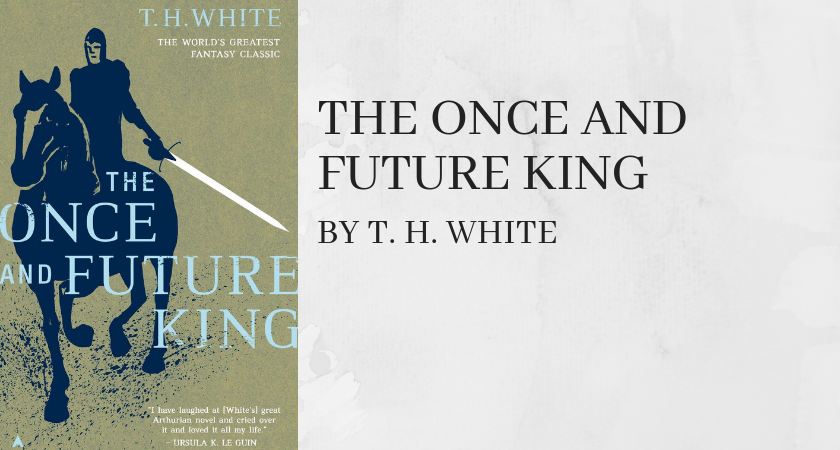I’ve been hearing fantastic things about this book for ages now, so I finally read it. I took pretty much the whole week to read (it’s actually pretty long), but I LOVED it and it feels like such a good book to welcome the Christmas season with.
The Once and Future King is a retelling of Authurian legends. According to its Wikipedia page, this was actually four shorter works collected and revised into one longer novel, which makes sense since it’s basically four different stories. The four “books” within this book are:
The Sword in the Stone – The opening story, this book introduces King Arthur not as a noble knight-in-training, but as a boy nicknamed Wart. He lives with his foster father, Sir Ector, and his foster brother, Kay, where he will one day become Kay’s squire. But one day, he runs into a wizard named Merlin, who ends up becoming his (and Kay’s tutor). This was the most lighthearted of the books and focuses on the formative years of Arthur. Merlin isn’t a serious wizard here; rather, he’s portrayed as an absent-minded man who lives out of time, resulting in a lot of anachronisms. Although this book is markedly different from the rest, it sets the stage for the latter three books as Merlin’s teachings have a great impact on the way Arthur thinks.
The Queen of Air and Darkness – In the second book, a young King Arthur (no longer Wart), fights to have the Kingdom under his rule. While there’s still plenty of humour from the adventures of King Pellimore, Sir Grummore, and the Questing Beast, this book is definitely more sober in tone compared to the first. This is where Arthur starts to articulate his ideas about Might vs Right and where the concept of the Round Table is first broached. This book also introduces the Orkney siblings, Gawaine, Gareth, Gaheris, and Agravaine, who will later become knights at Arthur’s court.
The Ill-Made Knight – The third book shifts its focus from Arthur to his most famous knight, Lancelot and later, the quest for the Grail. Here, Lancelot is seen as basically fighting against contradictory passions – his love for the Queen, his love for Arthur, and his love for God and his principles. The book writes that:
“[T]he curious thing was that under the king-post of keeping faith with himself and with others, he had a contradictory nature which was far from holy. His Word was valuable to him not only because he was good, but also because he was bad.”
Lancelot’s awareness of his bad nature is what makes him good. Unlike Arthur, who by nature is sunny and pretty much an all-around good guy, Lancelot has to work at being good. He is basically the best result of Arthur’s principles since he believed them from the moment he met Arthur.
Unfortunately, the court consists of more than Lancelot and the infighting starts. While the next book focuses on the decay of Arthur’s court, you can see its descent start towards the end of The Ill-Made Knight.
The Candle in the Wind – This last book is completely opposite from the first in tone. Arthur has grown old, and he has seen his plan to channel Might for Right slowly fail. The younger generation, represented by Mordred (his illegitimate son) have completely different ideas. While Arthur is wise and gentle, he is no longer an imposing figure. Still, Arthur’s ideas about Justice and Mercy come across the most strongly in this book – because he is just, he must make hard decisions. This is the saddest book of the four and the references to The Sword in the Stone make it very poignant.
Needless to say, I loved The Once and Future King. The amount of humour and anachronisms in the first book surprised me, but it never felt excessive or try-hard. It just worked. And as the story progressed, the book slowly got darker and darker, and you can feel the hope and idealism of the first book slowly fade away. This is truly a timeless story, with lessons we can all learn. As part of the ending puts it:
“There would be a day – there must be a day – when he would come back to Gramarye with a new Round Tabe which had no corners, just as the world had none – a table without boundaries between the nations who would sit to feast there. The hope of making it would lie in culture. If people could be persuaded to read and write, not just to eat and make love, there was still a chance that they might come to reason.”
